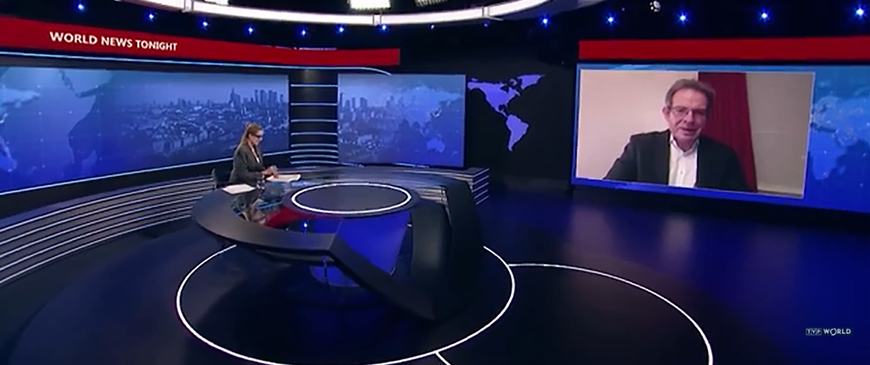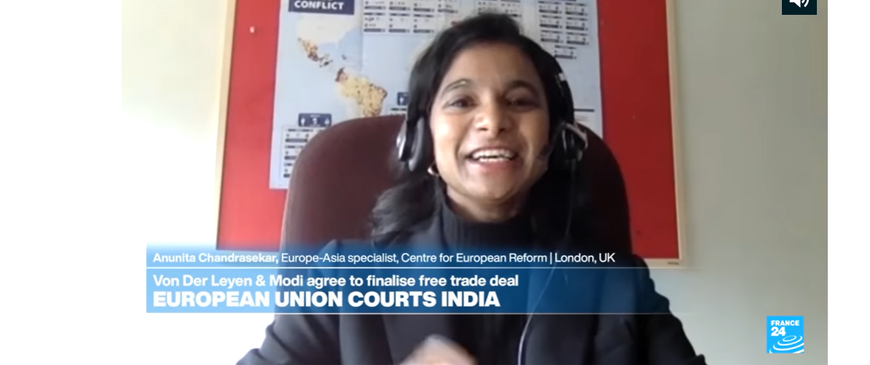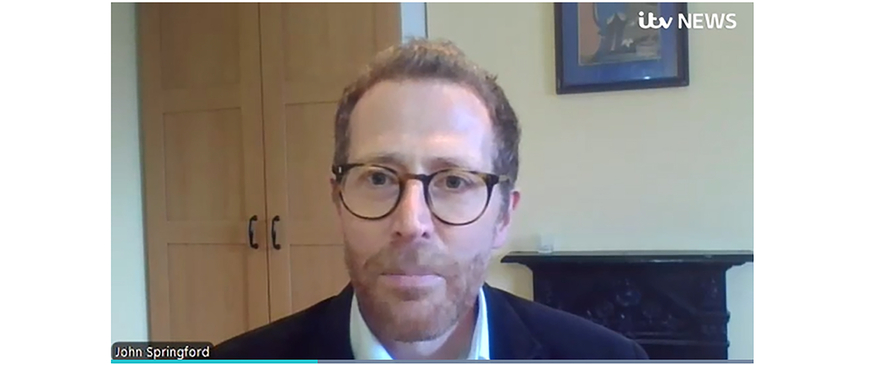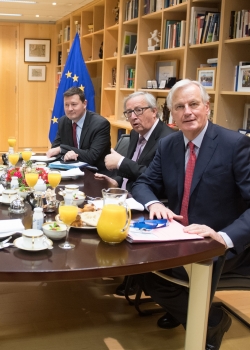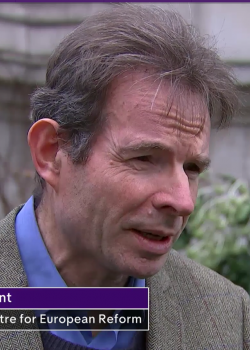Press
Think-tank disputes reporting bias in Treasury Brexit studies
01 February 2018
Financial Times
The controversy over leaked assessments of the economic damage of Brexit has deepened after a right-leaning think-tank was forced to deny it told ministers that supposedly independent civil service studies on the matter were deliberately skewed. Charles Grant, director of the Centre for European Reform said in a statement on Thursday that he recalled discussing Treasury research into Brexit with minister Steve Baker. But “I did not say or imply that the Treasury had deliberately developed a model to show that all non-customs union options were bad, with the intention to influence policy”, he added.
Brexit minister forced into apology for maligning civil service
01 February 2018
The Guardian
Rees-Mogg was referring to an alleged conversation between Baker and Charles Grant, the director of the Centre for European Research and an expert on EU negotiations, at a lunch at the Tory party conference. However, several individuals present at the event challenged the claim, including Grant himself and a Tory MP, Antoinette Sandbach. Prospect magazine later issued an audio of the conversation in which there is no suggestion about officials trying to rig the analysis. After the audio emerged, Baker said his answer was based on an “honest recollection of the conversation” but he now stood corrected. He added that he would apologise to Grant and clarify his comments in parliament.
Government rift over Brexit assessments: Now Tories turn on the Treasury
01 February 2018
The Evening Standard
The drama started when his fellow Brexiteer Jacob Rees-Mogg asked Mr Baker to confirm that he had been told by Charles Grant, of the Centre for European Reform, that “officials in the Treasury have deliberately developed a model to show that all options other than staying in the customs union were bad and that officials intended to use this to influence policy”.
UK minister accused of undermining the civil service
01 February 2018
Financial Times
Jacob Rees-Mogg, a leading anti-EU Conservative MP, had asked Mr Baker in the Commons to confirm whether he had been informed by a think-tank that the Treasury had “deliberately developed a model to show that all options other than [the UK] staying in the [EU] customs union were bad and that officials intended to use this to influence policy”. ...Mr Rees-Mogg suggested Mr Baker had been given this information by Charles Grant, the head of the Centre for European Reform, a think-tank. Mr Grant responded later by saying he recalled discussing Treasury research into Brexit with Mr Baker last October. But Mr Grant added: “I did not say or imply that the Treasury had deliberately developed a model to show that all non-customs union options were bad, with the intention to influence policy.
Tory minister blasted for failing to shoot down 'conspiracy theory' about civil servants trying to sabotage Hard Brexit
01 February 2018
The Mirror
A Tory minister faces fury after he failed to challenge a "conspiracy theory" that civil servants are trying to sabotage Hard Brexit. Brexit minister Steve Baker said it was an "extraordinary allegation" that Treasury officials - who are meant to be impartial - have been promoting staying in the customs union in order to influence policy. Speaking in the House of Commons, told MPs the theory was "implausible" but did not say it was untrue - making his boss, Brexit Secretary David Davis, visibly wince. That's despite the man accused of making the claim, Charles Grant of the Centre for European Reform, categorically denying he ever did so.
Pro-Brexit Minister attacks civil service, spurring backlash
01 February 2018
Bloomberg
Baker, who was a key figure in the Leave campaign, told the House of Commons on Thursday that he had been told by Charles Grant, director of the Centre for European Reform, that Treasury officials had sought to distort economic modeling on Brexit to force a change in government policy. He was responding to a question from Jacob Rees-Mogg, a devoted Brexit backer who is a potential leadership rival to Theresa May.
Minister accused of failing to challenge 'half-baked' Brexit 'conspiracy theory'
01 February 2018
Sky News
Jacob Rees-Mogg asked Mr Baker to confirm if he had been told by the Centre for European Reform's Charles Grant that "officials in the Treasury have deliberately developed a model to show that all options other than staying in the customs union were bad and that officials intended to use this to influence policy".
This civil servants' union boss says the PM should consider whether Steve Baker is fit to be a minister
01 February 2018
BuzzFeed
Steve Baker was asked by Tory MP Jacob Rees-Mogg in the House of Commons on Thursday to confirm that he had heard that Treasury officials had "deliberately developed a model to show that all options other than staying in the customs union were bad and that officials intended to use this to influence policy".The apparent foundation for the claim was later called into question by Centre for European Reform director Charles Grant, the man Rees-Mogg named as the source for his claims.Grant issued a statement that said he "did not say or imply" that the Treasury "had deliberately developed a model to show that all options outside the customs union were bad with an intention to influence policy".
Steve Baker accepts mistake in civil service 'conspiracy theory' row
01 February 2018
BBC News
During Commons Brexit questions, prominent Brexiteer Jacob Rees-Mogg had asked Mr Baker to confirm if he had heard from Charles Grant, of the Centre for European Reform think-tank, that "officials in the Treasury have deliberately developed a model to show that all options other than staying in the customs union were bad and that officials intended to use this to influence policy".
Is Jersey's EU relationship the key to Brexit success?
31 January 2018
Jersey Evening Post
John Springford and Sam Lowe, of the Centre for European Reform, have proposed that by emulating the Island’s trade relationship with the EU, the UK government could resolve the Irish border issue and secure enough bargaining power to apply tighter immigration controls, which are two key Brexit issues.
Italian elections likely to ensure ongoing political instability
31 January 2018
The Irish Times
“Hopes that Italy could be the third engine of a Franco-German partnership to renew the EU are probably mistaken,” writes Luigi Scazzieri of the Centre for European Reform. “No matter what happens on March 4th, tensions between the new government and the EU are assured.”
CER podcast: Brexit negotiations phase 2: The politics of regulatory alignment
31 January 2018
Charles Grant talks to Sophia Besch about how the EU-27 view the British idea of a bespoke post-Brexit partnership based on regulatory alignment.
Italy's election is no game-changer
31 January 2018
Financial Times
Luigi Scazzieri at the Centre for European Reform thinks that even if populists of any stripe get into power in Italy, it won't change much for the course of eurozone and EU policy.
Brexit: A view from Warsaw
30 January 2018
Policy Network
Poland has a lot of skin in the game when it comes to ensuring a good Brexit deal.
Angela Merkel wants to punish Britain because she's worried more countries will quit EU if we get a good deal
29 January 2018
The Sun
According to the influential Centre for European Reform think-tank it is France, Germany and the EU Commission that are opposed to a good deal. ...CER Director Charles Grant said UK officials have noted that “several member-states are uncomfortable with the hard line taken by France, Germany and the Commission”. Meanwhile, bureaucrats in Berlin and Paris fear that they are becoming increasingly isolated due to their tough approach, meaning it will be “harder for France and Germany to get their way” in the second phase.
Data errors undermine UK emphasis on services, says ONS
29 January 2018
Financial Times
Sam Lowe, a research fellow at the Centre for European Reform, said the ONS data raise the question: “What if we aren’t the powerhouse in services, what if we’re not as good as we think and we’re putting all our negotiating eggs in the [services] basket?”
UK will not be able to block new EU laws during Brexit transition, says Barnier – as it happened
29 January 2018
The Guardian
This Centre for European Reform briefing explains this issue in more detail. Here is an excerpt from the report, written by Sam Lowe."As well as binding the UK to the EU’s single market and customs union, the draft proposal seeks to ensure that the UK continues to apply the bloc’s external tariff rates and performs the same border checks with non-EU countries. This could easily result in a scenario in which UK exporters are no longer able to take advantage of the EU’s existing free trade agreements, but exporters located in countries with EU FTAs [free trade agreements] would continue to benefit from preferential access to the UK market on the same terms as now.
Użycie artykułu 7 wobec Polski coraz mniej prawdopodobne
29 January 2018
Rzeczpospolita
Dodatkowo poza Polską problemy mają też inne kraje. Tradycyjnie Węgry, ale teraz Komisja jest poważnie zaniepokojona reformą wymiaru sprawiedliwości w Rumunii. Do tego dochodzi skorumpowana Bułgaria i Czechy, gdzie premierem może zostać człowiek oskarżany o defraudację unijnych funduszy. – Są kraje, które same mają problem z praworządnością i nie będą głosowały przeciwko Polsce. A są takie, które uważają, że to nieskuteczny instrument – uważa Agata Gostyńska-Jakubowska, ekspertka think tanku CER. Według niej polski rząd w krótkim terminie wygra, bo nie będzie większości 22 państw za uruchomieniem artykułu 7.
Channel 4 News: Brexit transition: Exclusive view of negotiating guidelines report
25 January 2018
Charles Grant told Gary Gibbon of Channel 4 News that the UK will have to accept the transition on the EU's terms.
Can Britain hit the reset button on Brexit?
25 January 2018
Bloomberg Businessweek
According to Sam Lowe of the Centre for European Reform, one of the goals of EU negotiators is to push May to explain the reality of Brexit to voters. “The second phase of the withdrawal negotiations, for the EU, is about forcing the UK to acknowledge the inherent trade-offs that come with Brexit,” says Lowe. “There is a hope that when and if they do come clean, then there will be a moment where the country goes, ‘Ah. Do we actually want to do this?’ ”

